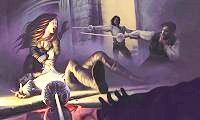 InterGalactic Medicine Show #50, March/April 2016
InterGalactic Medicine Show #50, March/April 2016
“May Our Voices Sing Like Blood from Open Wounds” by Jason Sanford
Reviewed by Robert L Turner III
Jason Sanford makes a brilliant connection between castrati and vampires in “May Our Voices Sing Like Blood from Open Wounds.” Set in renaissance Italy, Uccello, a failed apprentice castrato, comes to live in the room of the Cardinal of Bologna’s vampire enforcer. There the two come to understand their shared traits and limited space in the realm of normal humanity. The story is well paced and extremely well written, hinting at deeper meanings while only occasionally becoming explicit. While not perfect, this is the best short story I have read in some time and deserves careful reading and perhaps award nominations.
“Cherry Red Rocketship” by James Maxey introduces us to Remy, a coffee runner in a future where contrabanding Java carries the death penalty. After blowing a deal, he steals a ship, heads to Mars and hooks up with his shape-shifting alien ex-girlfriend. The story is a light silly romp that fails to gel. It seems to be aiming for a golden age or slightly later feel, but ends up disappointing. At the end, the story is not moving, engaging or entertaining.
Set in the 2040s “Jupiter or Bust” by Brad R. Torgersen details a reality show funded trip to Jupiter. After many failed efforts, Dr. Debra Galton is able to find funding for her experimental engine design, but her backer is a TV mogul who plans to finance the trip through product placement. At times a bit silly, the story abruptly focuses when an accident forces the crew to decide whether to continue or return to Earth. That particular scene is beautifully written and outshines the rest of the story. Overall, the work is interesting, but does not particularly stand out from other similar stories.
“Middle Child Syndrome” by Scott M. Roberts is a genuinely creepy story that combines the magical, normal parental fears, and mental illness into an engaging story that pulls you along while making you dread the next sentence. The story recounts a typical family’s struggle to deal with the seeming mental breakdown of their 10 year-old son. Roberts quickly inserts supernatural elements that make this an excellent story of dread. My one nitpick with this otherwise excellent story is that the leitmotif of paper pieces peters out before the end of the story. It would have been better to either continue the theme or remove it.
In “The Silver of Our Glory, The Orange of Our Rage” Jared Oliver Adams takes the reader to an alien world in which a beetle-like intelligence is beginning to end the industrial era. The narrator sabotages the culture’s first dirigible in order to get revenge upon the Emperor who has destroyed something that the narrator dearly loved. The author makes good use of the culture and biology of the alien species to push the narration along and everything flows logically from the motivations and biological realities of the species. The story ends ambiguously and leaves the reader to determine any meaning that may be found. Overall, the story is well crafted and enjoyable.
Robert Turner is a professor and long term SF reader.